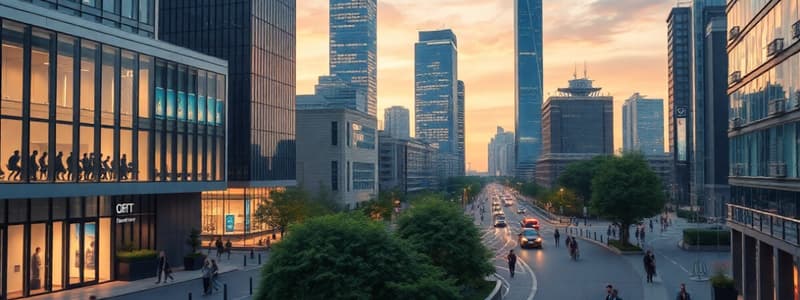Podcast
Questions and Answers
What is a primary objective of the VIKISIT BHARAT @2047 initiative?
What is a primary objective of the VIKISIT BHARAT @2047 initiative?
- To promote industrial expansion in non-urban areas
- To increase the number of rural areas
- To limit the use of technology in cities
- To transform urban areas into smart cities (correct)
Which feature is NOT part of the key features of Smart City development under VIKISIT BHARAT @2047?
Which feature is NOT part of the key features of Smart City development under VIKISIT BHARAT @2047?
- Digital Infrastructure
- Smart Mobility Solutions
- Integrated Urban Planning
- Decline of green spaces (correct)
What role does data analytics play in smart city development?
What role does data analytics play in smart city development?
- Promotes the use of traditional methods over modern solutions
- Improves city services and urban planning (correct)
- Restricts access to information for residents
- Limits the integration of technology in daily life
Which of the following is a challenge faced by the initiative?
Which of the following is a challenge faced by the initiative?
How does the initiative plan to ensure inclusivity in smart city initiatives?
How does the initiative plan to ensure inclusivity in smart city initiatives?
Which form of energy is emphasized in the sustainable energy aspects of the initiative?
Which form of energy is emphasized in the sustainable energy aspects of the initiative?
Which best describes the intended impact of smart city development on job creation?
Which best describes the intended impact of smart city development on job creation?
What technological feature is installed for better city management and monitoring?
What technological feature is installed for better city management and monitoring?
Which aspect is crucial for building resilient cities in the VIKISIT BHARAT @2047 initiative?
Which aspect is crucial for building resilient cities in the VIKISIT BHARAT @2047 initiative?
What is the significance of smart mobility solutions in the initiative?
What is the significance of smart mobility solutions in the initiative?
Flashcards are hidden until you start studying
Study Notes
Smart Cities Development under VIKISIT BHARAT @2047
-
Objective: Transform urban areas into smart cities that enhance the quality of life through technology, sustainability, and efficient governance.
-
Key Features:
- Integrated Urban Planning: Coordinated development of infrastructure, housing, and public spaces.
- Digital Infrastructure: Implementation of high-speed internet and Wi-Fi hotspots to ensure connectivity.
- Smart Mobility Solutions: Promotion of electric vehicles, public transport improvements, and pedestrian-friendly pathways.
- Sustainable Energy: Use of renewable energy sources, smart grids, and energy-efficient buildings.
-
Technological Integration:
- IoT and Sensors: Deployment of smart sensors for traffic management, waste management, and energy conservation.
- Data Analytics: Utilization of big data to improve city services and urban planning.
- Citizen Engagement Platforms: Mobile apps and portals for real-time feedback and involvement in governance.
-
Sustainability Goals:
- Green Spaces: Development of parks and green belts to enhance urban biodiversity.
- Water Management: Smart water systems for monitoring and conservation of water resources.
- Waste Management: Implementation of smart waste collection systems using IoT technology.
-
Economic Impact:
- Job Creation: New employment opportunities in tech-driven sectors and urban services.
- Attracting Investments: Improved infrastructure and living conditions to draw domestic and foreign investments.
-
Challenges:
- Funding and Resources: Need for substantial financial investment and public-private partnerships.
- Technological Barriers: Ensuring access to technology for all sections of the population.
- Urban Governance: Effective coordination among various government agencies and stakeholders.
-
Future Vision:
- Inclusivity: Ensuring that smart city initiatives benefit all citizens, including marginalized communities.
- Resilience: Building cities that can withstand economic, environmental, and social challenges.
- Global Standards: Aligning with international smart city benchmarks for best practices and technology adoption.
Smart Cities Development under VIKISIT BHARAT @2047
- Objective focuses on enhancing quality of life in urban areas through technology, sustainability, and improved governance.
- Integrated urban planning ensures coordinated development among infrastructure, housing, and public spaces to create cohesive environments.
- Digital infrastructure highlighted by the establishment of high-speed internet and extensive Wi-Fi hotspots to improve connectivity for residents.
- Smart mobility solutions include promoting electric vehicles and enhancing public transport, alongside creating pedestrian-friendly pathways for safer travel.
- Adoption of sustainable energy through renewable sources, smart grids, and construction of energy-efficient buildings aims to reduce carbon footprints.
- Technological integration features include smart sensors for efficient traffic management, effective waste disposal, and conservation of energy resources.
- Data analytics plays a crucial role in refining city services and urban planning, utilizing big data for informed decision-making.
- Citizen engagement platforms like mobile apps and online portals facilitate real-time feedback and active participation in governance processes.
- Development of green spaces, such as parks and green belts, contributes to urban biodiversity and enhances the living environment.
- Smart water management systems enable real-time monitoring and conservation efforts, optimizing usage of water resources.
- Innovative waste management systems using IoT technology improve waste collection efficiency and promote recycling efforts.
- Economic impact anticipated through job creation in tech-oriented sectors and urban services, boosting local employment.
- Attracting investments is facilitated by improved urban infrastructure and living conditions, appealing to both domestic and international investors.
- Challenges in development include the necessity for substantial funding and fostering public-private partnerships to finance projects.
- Addressing technological barriers is vital to ensure equitable access to advancements for all demographics within urban populations.
- Urban governance demands effective coordination among various government agencies and stakeholders to implement smart city initiatives successfully.
- Future vision emphasizes inclusivity to ensure benefits reach all citizens, particularly marginalized and disadvantaged groups.
- Resilience in urban design aims to withstand economic, environmental, and social challenges, preparing cities for future uncertainties.
- Aligning with global standards helps cities adopt best practices in technology and governance, aiming for international benchmarks in smart city development.
Studying That Suits You
Use AI to generate personalized quizzes and flashcards to suit your learning preferences.




